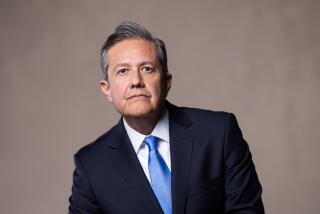Aiding Poor a Welcome Task for Millionaire
- Share via
WASHINGTON — Deborah Szekely was 62 years old and admittedly starting to feel lazy when she found the challenge she wanted as president of the Inter-American Foundation, a small, federally funded foundation that works in Latin America.
There were some who questioned whether Szekely, a Republican who became a millionaire by running a health spa for the overweight rich, was the right person to help poor Latin Americans.
But Szekely, now 67, quickly proved that she could do the work and do it well.
“She has been a stalwart. . . . She has done the kind of job that the Inter-American Foundation was created to do . . . and she has done it with great gusto,” said Rep. Dante Fascell (D.-Fla.), who helped shape the legislation that created the agency in 1969.
Szekely, founder of the Golden Door health spa, did have other options. She had a chance to publish a magazine in New York. She considered moving to Paris and studying philosophy at the Sorbonne. She could have spent her time traveling and partying.
But Szekely decided that what she really wanted was “something to stew and fret and worry about.” Wrestling with the problems in Latin America has helped satisfy that craving, she said.
Starting a second career at the foundation and coping with the challenge of the work there also has sharpened her mind, kept her vital and enabled her to blossom late in life.
“You can’t stretch if you aren’t challenged,” she said, “and if you mind isn’t stretched, how do you keep your body flexible? The flexibility of both are so interwoven.”
In her Arlington, Va., office, brightened by colorful dolls and crafts made by Latin American artisans and presented to her as gifts, Szekely talked about the poverty she has seen on some of her trips.
Growing up during the 1930s as a child in Mexico, Szekely saw plenty of poor people. “But every home had a vegetable garden, a goat tied in back, a few pigs, chickens underfoot. Today, because of the increased population, they have nothing. You go into houses, and there is nothing.”
As foundation director, Szekely oversees an agency with a staff of about 70 people and a mandate to support the self-help efforts initiated by poor people in 32 countries of Latin America and the Caribbean.
When she travels, Szekely wears practical slacks, shirts and sandals. Her elegant and expensive business suits stay in the closet of her Georgetown home here. When necessary, she stays overnight in the field and sleeps in a hammock, in keeping with local customs.
Although she is a self-described “health nut” who avoids meat at home, she has learned to eat fresh-killed chicken, barbecued goat and skinned guinea pig when it is served to her as an honored visitor. “When you have to eat shoe leather, I eat shoe leather,” she said.
Szekely never doubted that this job was perfect for her when she began lobbying the foundation’s board of directors to hire her as president in 1984. She already spoke Spanish. She had worked in Mexico.
And she knew first-hand about development and management. She and her first husband, Bordeaux Szekely, opened their health spa, Rancho La Puerta, in Baja California in 1940.
“It was $17.50 a week, bring your own tent,” she said. “We had kerosene lamps, outhouses. We started with absolutely nothing.”
Szekely opened a second spa, the Golden Door, in Escondido, Calif., in 1958. She and her husband were divorced in 1969. Her second marriage also ended in divorce.
But her businesses were booming. The Golden Door, which now charges $3,500 a week, has attracted such guests as Cher and Sen. Alan Cranston (D-Calif.)
Szekely sees a basic similarity in trying to serve the very rich and the very poor.
“The most important thing is listening to what they are trying to say,” she said. “The poor have the same ambition as the rich: They want a more fulfilling life. So you listen to what they are trying to say and try to establish what they need and how you can help.”
The worst poverty, she said, is in Brazil and along the Amazon tributaries, “where the only thing the people have is 10 kids. A woman has 20 births and maybe 10 live kids. And once in a while they will have a cassette radio, but no electricity. And the schools are a disaster.”
More than 80% of the foundation’s $28-million annual budget last year was given as grants to stimulate development in Latin and Caribbean countries.
Grants have helped farmers in Bolivia buy a tractor to grow more vegetables, enabled fishermen in Venezuela to purchase equipment they needed to market their catches and provided assistance to women artisans in Ecuador operating knitting and weaving businesses.
Szekely believes she can apply what she has learned in Latin America in the United States. So she is now planning a third career, in which she hopes to establish a nonprofit agency to improve life of inner-city residents, just as the foundation has sought to make life better for poor Latin Americans.
“I have always taken on big problems and big headaches,” Szekely said.
More to Read
Sign up for Essential California
The most important California stories and recommendations in your inbox every morning.
You may occasionally receive promotional content from the Los Angeles Times.













